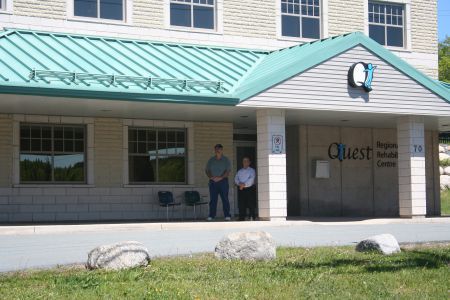KJIPUKTUK (HALIFAX) – Over the years the Quest Regional Rehabilitation Centre in Lower Sackville has seen its share of violent incidents. The institution is home to 24 individuals with developmental and/or physical disabilities. Many residents are held there against their will.
Typically when Quest makes the headlines Community Services counters that things are just fine. But when resident Gordon James Longphee died in May 2014 after being attacked by a fellow resident Community Services minister Joanne Bernard had to act.
Bernard announced an independent review of best practices at Quest. Well over a year later the results of that review have now been made public.
The executive summary suggests that things are well under control. But in the body of the report, written by Ontario-based Mary Jane Hampton of Stylus Consulting Inc., there are issues raised that indicate all is not well at Quest.
The picture that emerges is one of a dreary, often tense and scary place.
In a focus group for residents, Hampton heard complaints about their inability to participate in supervised community-based activities because of a lack of staff.
“Most days they feel bored,” they told Hampton.
“The physical location of the facility between a highway, an exit ramp and a main thoroughfare makes such things as taking a walk outside stressful (even dangerous),” Hampton writes.
Shouting, physical outbursts and slamming doors at any time of the day and night is common.
“Who wouldn’t go crazy living here?”, one of the residents wonders.
It's worth noting that this is all feedback from a residents' focus group that had participants hand-picked by staff. The make-up of a second focus group consisting of parents was also based on staff suggestions, ensuring that parents critical of the institution were excluded from providing any meaningful input.
Staff training standards are insufficient, Hampton says, and she blames Community Services. The department has always argued that staff training is not its concern, beyond defining high-level requirements.
Not good enough, says Hampton.
“(Community Services) should consider updating and then standardizing core competencies for RRC staff, and support an agency to take the lead in designing and delivering training programs so that those competencies can be maintained,” one of the recommendations states.
Quest needs to recognize that it accommodates two very different groups of residents, Hampton believes.
Some are there for a limited time, and will eventually transition to small option homes (assuming that there are vacancies, of course), while others will never leave.
The tension between these different needs in terms of care is creating complexities that would be best resolved if there was a separate facility to house the long-term residents, Hampton argues.
Hampton is also critical of a governing board that was allowed to dwindle to a mere four members, and urges that vacant staff positions for a psychologist and behavioural analyst be filled “as soon as possible.”
The Nova Scotia Association of Community Living (NSACL), a stakeholder group that advocates for more inclusive approaches for people who are labeled with intellectual disabilities, has seen enough.
“Too many Nova Scotians who have a disability continue to be forced to live in large, congregated settings with no choice in their lives,” writes Jean Coleman, Executive Director for the NSACL, in a press release in response to the Hampton report.
The NSACL press release refers to Article 19 of the UN Convention on the Rights of People with Disabilities, which Canada has ratified.
That clause states that people with intellectual disabilities have the right of equal access to the range of appropriate and affordable housing available in their community that is based on choice, self-determination, and individualized funding.
“So long as a single bed is filled at Quest, the rights of Nova Scotians with intellectual disabilities are being denied. We can and should do better,” Coleman writes. “This is about basic human rights.”
For more coverage of Quest by the Halifax Media Co-op, click here.
Follow Robert Devet on Twitter @DevetRobert



